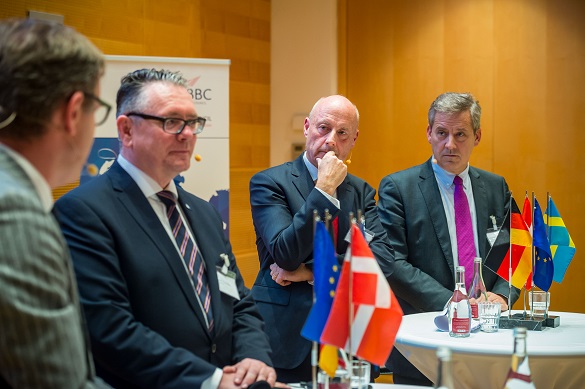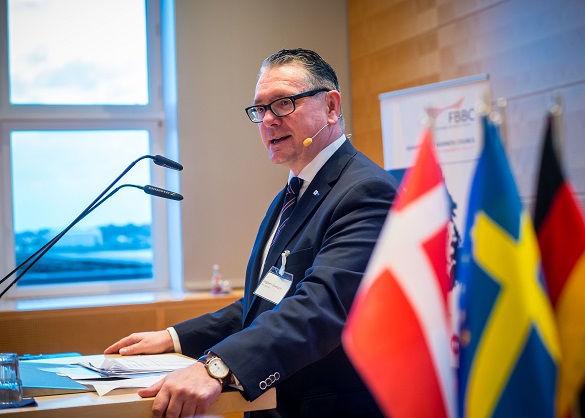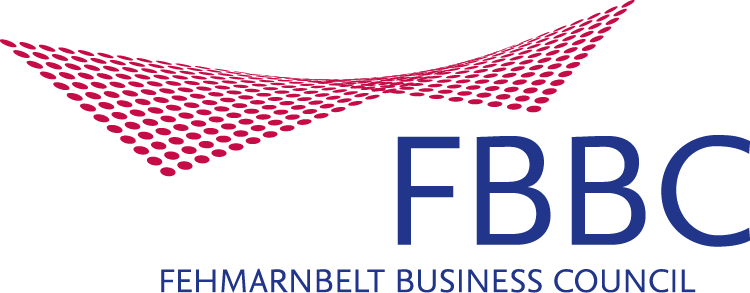For the last ten years, the members of the Fehmarnbelt Business Council (FBBC) in northern Germany, Denmark and southern Sweden have been committed to seizing the opportunities for the region presented by the construction of the Fehmarnbelt fixed link. At an official ceremony held in Kiel’s state parliament building, FBBC CEO Siegbert Eisenach took stock of what has been achieved: ‘After ten years, the things that motivate us and inspire us remain unchanged: we want to get to know one another, share ideas and learn from each other, work together and grow side by side in the global competitive arena. And we want to do all of this across borders.’

In front of more than 100 representatives from the world of politics, business and administration as well as a number of international guests, Eisenach stressed that the Fehmarnbelt project is not only important to Denmark and Germany, but the whole of Europe. ‘It allows us to close a gap in the Trans-European Transport Network. We also want to develop the corridor for the benefit of the regions that lie between the cities of Hamburg and Copenhagen/Malmö.’ At the same time, he underlined that people should think bigger: ‘Fehmarn is in the heart of northern Europe. We want to build bridges, even if it is a tunnel. Once the tunnel is completed, the northern European heart will beat even more strongly when the power centres move even closer together. Accordingly, we can and also want to profit even more from the immediate proximity to Scandinavia.’

Schleswig-Holstein’s Minister of Economic Affairs, Transport, Employment, Technology and Tourism, Dr Bernd Buchholz, thanked the FBBC for the work it has done to date. He told those gathered that the business union is hugely important. ‘It gives the region a voice that focuses on positive developments. And that is essential, because otherwise people may get the impression that there are only critics of the Fehmarnbelt fixed link. This is most definitely not the case,’ he said. He then went on to say that the construction of the tunnel is establishing a dynamic development axis from Malmö to Hamburg. ‘This creates new business collaboration opportunities, opens up possibilities for scientific and cultural cooperation, simplifies training paths with posts in the neighbouring country and promotes a common employment market for skilled professionals,’ said Buchholz.
The Fehmarnbelt fixed link will be so much more than just a transport project that accommodates the growing traffic in future, particularly in the area of commercial logistics. It will be a visible sign, cast in concrete, of the closest cooperation between Denmark, Schleswig-Holstein and Sweden. ‘At a time when the EU is subject to considerable criticism, I should particularly point out that the European idea is committed to linking people, to engaging in dialogue, to breaking down borders. This should help strong regions to develop into a common economic area, irrespective of national borders. And the Fehmarnbelt region is an outstanding example of this,’ stressed the minister.
Michael Svane, vice chairman of the FBBC, highlighted the positive impact that such linking structures have on the economy and the region: ‘The bridge across the Great Belt made Denmark the country it is today. Only after the bridge was built did the country grow together, creating a new mental geography.’
Svane was confident that the German side would soon approve the construction of the tunnel. He said that he understood the opponents’ and critics’ objections. ‘On the Great Belt we listened to the concerns of the environmentalists and took many individual steps to optimise the project,’ he said. In hindsight, it became apparent that many of the voiced fears turned out to be unfounded. ‘The Baltic Sea is in better shape than beforehand, the former ferry workers have new jobs and, above all else, many companies have moved to the Copenhagen–Aarhus axis.’
Svane sent out a clear message: ‘We must seize the opportunities created by the Fehmarnbelt fixed link, for the regional economy and for the people on both sides of the Fehmarnbelt.’ He said that he himself originally comes from the island of Lolland and knows how important the project is for the development of this part of Denmark. ‘People should not only be pleased about getting to Copenhagen more quickly,’ said Svane. ‘Young people should also recognise the benefits of living virtually around the corner from Lübeck – which is much closer than Copenhagen – or Hamburg.’ He went on to say that it was important to see training or living across the border as a real option in future.

Stephan Müchler, CEO at the Chamber of Commerce and Industry of Southern Sweden, emphasised the importance of the work being done by business representatives to draw people’s attention to the new opportunities being created on both sides of the border. He said that the example of the Öresund Bridge between Copenhagen and Malmö in particular has shown how important it is to work at an early stage on improving the conditions for living and working in a common region by implementing specific measures. In terms of detail, he and Michael Svane, vice chairman of the FBBC, agree that there is still a great deal to do.
In closing, FBBC CEO Eisenach said that the FBBC partners not only talk to one another, but also plan joint activities and projects. ‘We know that there is still a great deal of work ahead of us. The map in our new infrastructure position paper is also proof of this. The tunnel is an integral part here. It can only exploit its full potential, however, if we also build and upgrade the road and rail links that connect to the tunnel under the Baltic Sea. As such, courses must be set and plans made that do not stop at national borders.’
